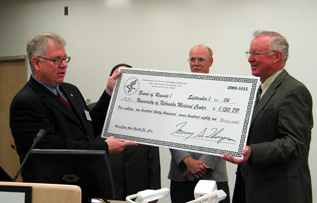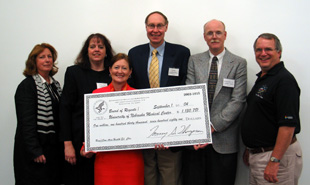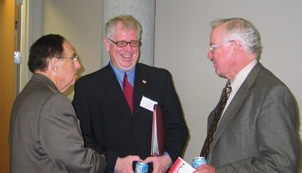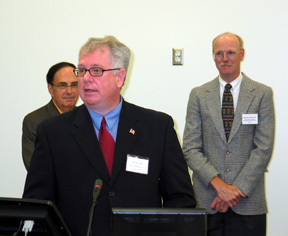 |
Fred Schuster, region VII director of the U.S. Department of Health and Human Services, presents a $1.13 million check to University of Nebraska Regent Randy Ferlic, right. Mike Sitorius, M.D., chairman of the UNMC Department of Family Medicine and program director for the Nebraska AHEC, is in the background. |
The AHEC program is part of the UNMC Rural Health Education Network (RHEN), which began in 1989, under which UNMC rural outreach education activities are developed.
AHECs are multi-institutional, multi-disciplinary, community-based programs that work with community and academic partners to address the primary health care work force needs and health promotion and disease prevention information needs of medically underserved communities. While each AHEC sets its own focus priorities, the primary role of AHECs is the recruitment and retention of health professionals to underserved areas, including a focus on minority recruitment.
The Panhandle AHEC, which will be located at Western Nebraska Community College in Scottsbluff, is being spearheaded by UNMC, Panhandle Community Services, Chadron State College, Western Nebraska Community College and area health care providers.
 |
From left, Sarah Cunningham, Ph.D., executive director of the Central Nebraska AHEC; Gretchen Forsell, executive director of the Northern Nebraska AHEC; Roxanna Jokela, deputy director of the Nebraska AHEC Program Office; Dave Palm, Nebraska AHEC advisory board member; Mike Sitorius, M.D., program director for the Nebraska AHEC; and Jim Woodland, Nebraska AHEC advisory board member. |
- working in partnership with regional entities to recruit rural students into health care career fields;
- retain health care professionals within the Panhandle through professional development and dialogue;
- collaborate with regional partners;
- assess health care needs, demands, and services in the Panhandle of Nebraska, and
- facilitate the development of activities or opportunities.
A committee that’s been an integral part in forming the Panhandle AHEC, will be charged to staff three full-time positions at the Panhandle AHEC, including the position of executive director. Joyce Hardy, Ph.D., senior vice president for academic and student affairs at Chadron State College, heads the committee. The executive director will report to a board of directors.
 |
From left, UNMC Chancellor Harold M. Maurer, M.D., talks with Fred Schuster of the U.S. Department of Health and Human Services and NU Regent Randy Ferlic. |
“Everyone involved is delighted with the recent grant award and we’re looking forward to the additional education and health benefits that should grow out of this collective effort,” said John Harms, president of the Western Nebraska Community College. “Once hired, the AHEC staff will work aggressively on expanding health care education and training projects, as well as expanding telecommunication opportunities for all health care providers in the area.”
The Panhandle AHEC joins two other centers – the Central Nebraska AHEC in Grand Island and the Northern Nebraska AHEC in Norfolk. The Northern Nebraska AHEC, formed in 2002, serves 22 counties, and the Central Nebraska AHEC, which serves 28 counties, was created in 2001.
 |
From left are Michelle Choutka of Battle Creek, a third-year UNMC medical student, Gretchen Forsell, executive director of the Northern Nebraska AHEC, and Kyle Smith of Norfolk, a pre-medicine student at the University of Nebraska-Lincoln. |
Michael Sitorius, M.D., chairman of the UNMC department of family medicine and director of the AHEC program in Nebraska, said the centers provide a means to augment what the state, university and rural communities already are doing to recruit, educate and train students to practice in rural Nebraska.
AHEC activities include working with local schools (grades K-12) in health career promotion, providing health career fairs and camps, assisting with health profession students to gain education experiences in underserved communities, and working with local health career providers to assure continuing education is available.
 |
Fred Schuster of the U.S. Department of Health and Human Services congratulates the UNMC community on receiving the competitive AHEC grant. In the background are UNMC Chancellor Harold M. Maurer, M.D., and UNMC’s Mike Sitorius, M.D., program director for the Nebraska. |
“AHEC staff live and work in the community and this allows them to better know the needs of the community,” Jokela said.
“Region I Behavioral Health Administration and Panhandle Mental Health Center are very excited about the Panhandle AHEC including behavioral health in its proposal,” said John McVay, Region I Behavioral Health Administrator in Scottsbluff. The Panhandle AHEC will provide the opportunity for ongoing primary care and behavioral health collaboration.
Fred Schuster, director of Region VII, U.S. Department of Health and Human Services, formally presented the $1.13 million grant to UNMC officials Thursday (Aug. 5) in Omaha. “Health care education, recruitment and training programs are key elements in growing tomorrow’s health care professionals and retaining them in underserved areas,” Schuster said.
|
|
Pre-medicine University of Nebraska-Lincoln student, Kyle Smith of Norfolk, said the AHEC in Norfolk has provided insight into different health professions and rural opportunities. Smith got involved in the AHEC last year in its health care career summer camp for middle and high school students and this year is a program assistant and camp chaperone.
“I’ve learned a lot about the health care opportunities in a rural area and the ability to have a broader range of duties that you may not have in a larger community,” Smith said. “They’ve helped me with my pursuit of a career in medicine.”